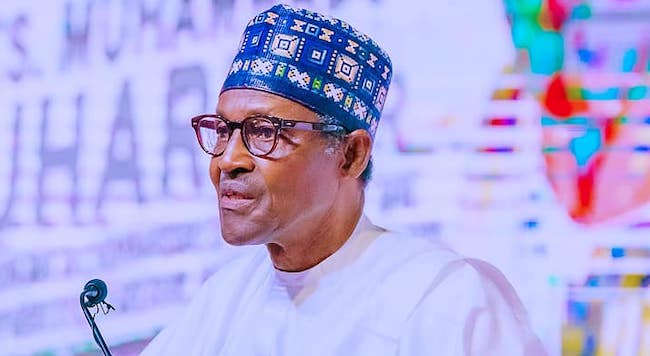Politics
SERAP, others drag Buhari govt to ECOWAS Court over failure to name, prosecute oil thieves

Socio-Economic Rights and Accountability Project (SERAP) has filed a lawsuit against the government of President Muhammadu Buhari over a “failure to probe the operations of illegal oil pipelines between 2001 and 2022, to name and prosecute those suspected to be involved, and to recover proceeds of crime.”
The suit was filed by SERAP, Chief Eric Dooh, (who is suing for himself as a leader of the Goi Community in Gokana Local Government Area of Rivers State, and on behalf of the Goi Community), and 15 other concerned Nigerians.
The suit followed recent reports of the discovery of at least 58 illegal oil pipelines used to steal the country’s oil wealth. The stealing is reportedly carried out through the illicit pipeline connected to the trunk line via an abandoned pipeline, and linked to a location in the high sea, where crude oil is loaded into vessels and sold overseas.
In the Suit No ECW/CCJ/APP/53/22 filed last Friday before the ECOWAS Court of Justice in Abuja, the Plaintiffs are seeking: “an order directing and compelling the Buhari government to immediately probe the reports of operations of illegal pipelines and oil theft, name and prosecute suspected perpetrators.”
The Plaintiffs are also seeking: “an order directing and compelling the Buhari government to fully recover any proceeds of crime, and to respect, protect, and fulfil the human rights of the people of Niger Delta that have continued to suffer the effects of oil theft by non-state actors.”
In the suit, the Plaintiffs are arguing that, “The Buhari government is failing to uphold its international legal obligations to ensure that the country’s oil wealth is used solely for the benefit of Nigerians, and that the wealth does not end up in private pockets.”
READ ALSO:SERAP threatens to sue Buhari if sponsors of attacks on INEC offices are not arrested
The Plaintiffs are also arguing that, “Poor and socio-economically vulnerable Nigerians have continued to pay the price for the stealing of the country’s oil wealth apparently by both state and non-state actors.”
According to the Plaintiffs, “Despite the country’s substantial oil wealth, successive governments have largely squandered the opportunity to use the wealth to improve the lives and well-being of ordinary Nigerians.”
The Plaintiffs are also arguing that, “the illegal pipelines have been operated for many years without notice, implying a flagrant violation of international human rights obligations to ensure the proper, effective and efficient management of the country’s wealth and natural resources.”
In the suit filed on their behalf by their lawyer Kolawole Oluwadare, the Plaintiffs contend that, “The plundering of the country’s oil wealth has resulted in the downward trend in revenue and increasing level of borrowing, with reports of a projected N11.30 trillion deficit budget for 2023.”
The suit, read in part: “The unaddressed plundering of the country’s oil wealth has for many years contributed to shrinking revenue, chronic underfunding of public goods and services such as education, health, and safe drinking water, recurring budget deficits, growing level of borrowing, and unsustainable debt profile.
“There are violations of the economic and social rights of the people of the Niger Delta including the rights to an adequate standard of living, and to economic and social development – as a consequence of the plundering of the country’s resources through the operations of illegal pipelines by non-state actors.
“The Buhari government has failed to exercise due diligence to prevent and combat oil theft; to investigate and prosecute suspected perpetrators, and recover proceeds of crimes; and to respect, protect, promote and fulfil people’s rights.
“The Plaintiffs contend that the resulting loss from the plundering of the country’s wealth and natural resources by non-state actors and state actors through the operations of illegal pipelines is a contributory cause of poverty and underdevelopment in the Niger Delta.”
The Plaintiffs further contend that the “majority of the people of Niger Delta and Nigeria as a whole continue to be denied access to basic necessities of life such as clean water, quality education, healthcare, food, a clean and healthy environment, and economic development.”
“This illegal oil connection has been operating for nine (9) years with about 600,000 barrels per day of oil lost in the same period.
“According to a Nigeria Extractive Industries Transparency Initiative (NEITI) audit report, 160 million barrels of crude oil valued at $13.7 billion were stolen between 2009 and 2012.
“The Plaintiffs contend that the destruction of vessels used for crude oil theft by security agencies under the command of the Defendant was illegal and was done to conceal the identity of the perpetrators.
“It is further contended that the forfeiture of any vessel used for illegal activity can only be lawfully carried out pursuant to the order of a Court of competent jurisdiction.”
Join the conversation
Support Ripples Nigeria, hold up solutions journalism
Balanced, fearless journalism driven by data comes at huge financial costs.
As a media platform, we hold leadership accountable and will not trade the right to press freedom and free speech for a piece of cake.
If you like what we do, and are ready to uphold solutions journalism, kindly donate to the Ripples Nigeria cause.
Your support would help to ensure that citizens and institutions continue to have free access to credible and reliable information for societal development.






















